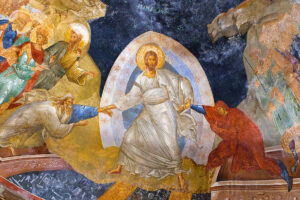On March 26, 1965, an astonishing photo appeared on the cover of Life magazine, one of the most popular news magazines of the mid-twentieth century. It featured the Rev. Dr. Martin Luther King, Jr., in Selma, Alabama, holding a wreath for the Rev. James Reeb, a Boston-based civil rights activist who had been beaten to death on March 11, 1965, four days before the photo was taken. But one of those who are in the photo with Dr. King caused an immense stir both in the United States and around the world.
With Dr. King are several supporters, as well as Walter Reuther, president of the United Auto Workers. Standing to Dr. King’s immediate right, however, is a strikingly dignified figure who stares resolutely at the camera, as if to convey that he was prepared to stand firm no matter what challenges and criticism came to him as a result of his stand: His Eminence Archbishop Iakovos, Primate of the Greek Orthodox Archdiocese of North and South America.
Archbishop Iakovos had gone to Selma in order to march alongside Dr. King and make a public stand for civil rights. Years later, His Eminence explained that his stance sprang from his experiences growing up in Turkey, where Greek Christians did not enjoy equality of rights: “I wasn’t born in the United States, to live and enjoy democracy. I came to the United States from Turkey, where I was a third category citizen. So when Martin Luther King Jr. had his walk to the courthouse of Selma, Alabama, I decided to join him because, I said, this is my turn to take revenge against all those who oppress people….I know that civil rights continues to be the most thorny issue in our nation, but I will stand for both civil and human rights as long as I live. I feel it’s the Christian duty and the duty of a man who was born as a slave.”
His Eminence had been a strong supporter of the Civil Rights Act of 1964, which brought a definitive end to segregation in the Southern states. When it was passed, he said: “Glory to the most high! May this mark the beginning of a new age for all humankind, an era when the word of God charts and guides our lives.”
In 1965, Archbishop Iakovos’ stand against racism was hardly universally popular. “Someone called me a traitor, some said I am not an American, some I am not a Christian,” he recalled. One of his aides recounted that “Iakovos had received threats, but he never thought twice of his decision.” Dr. King’s widow, Coretta Scott King, observed that “at a time when many of the nation’s most prominent clergy were silent, Archbishop Iakovos courageously supported our Freedom Movement, and marched alongside my husband, and he continued to support the nonviolent movement against poverty, racism and violence throughout his life.”
The Life magazine cover had reverberations even beyond the civil rights movement. The New York Times stated: “The striking cover of Time [sic] magazine that showed Dr. King side by side with the black-garbed Archbishop Iakovos marked a new presence of Greek Americans and the Greek Orthodox Church in American life.”
That new presence of the Greek Orthodox Church in American life was made possible by the faith of one remarkable man, whose stance in the face of threats bore fruit far beyond anything he could have imagined. The life and ministry of Archbishop Iakovos stand as an enduring witness to the truth of the words of the Lord Jesus Christ: “Truly, I say to you, if you have faith as a grain of mustard seed, you will say to this mountain, ‘Move from here to there,’ and it will move; and nothing will be impossible to you.” (Matthew 17:20)






